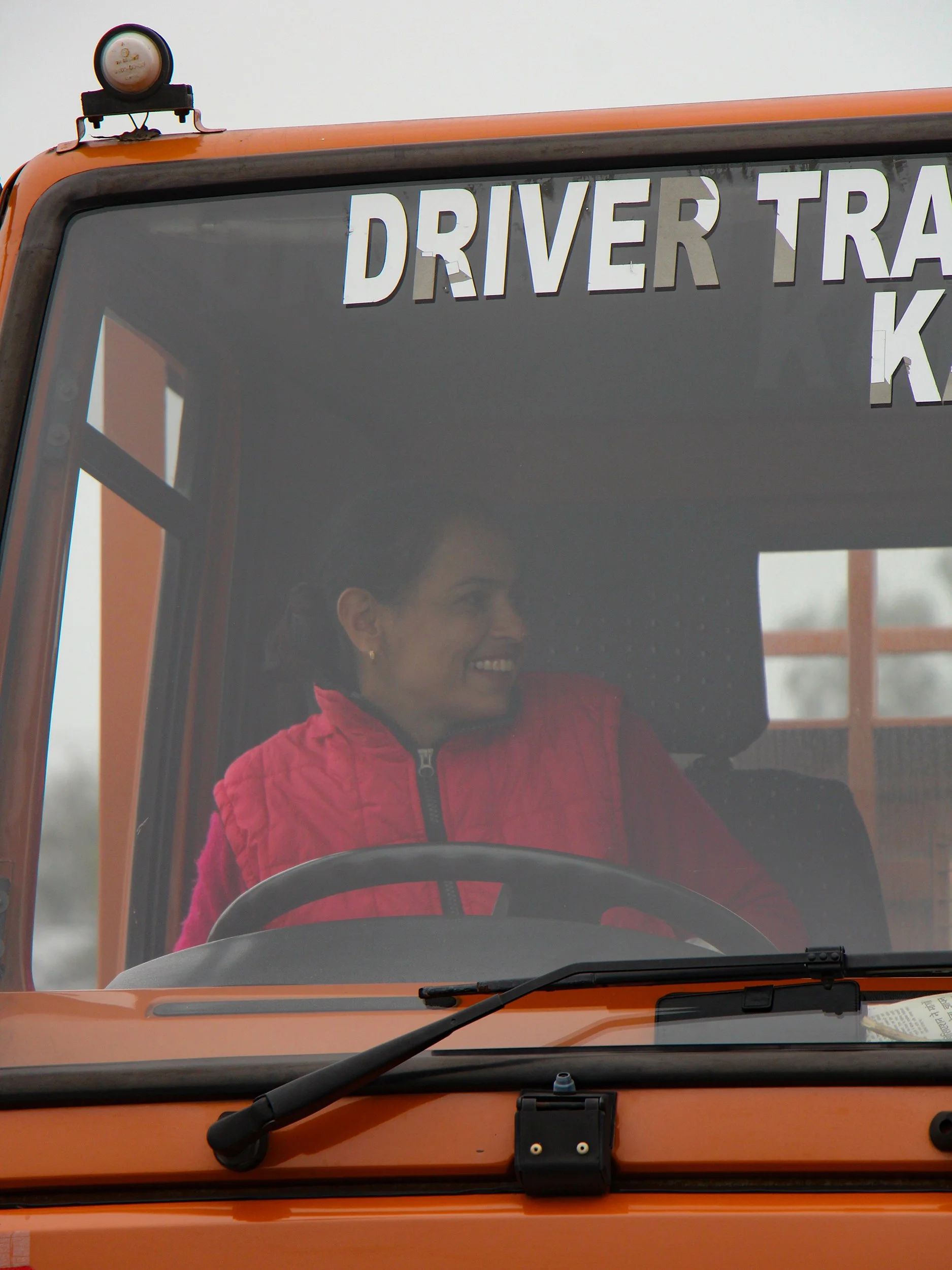A name for herself
One woman fills her schedule with ambitions and reaches for her dreams while feeling held back by a lack of respect in her marriage.
By Anna Pearson
Sonia stands in the courtyard of her home in Titram, on the brink of a smile as she poses for a portrait. The courtyard is often full of life, as women and children of the village gather wherever Sonia is. | Photo by Anna Pearson
Sonia is known by her own name, not her husband’s.
In the village of Titram in Haryana, Sonia pursues independence through the salon she runs on the main street, the community of women in the village and packing her daily schedule. Most of the women who gather in her salon or courtyard each day are called by their husband’s names when talked about by others.
At 35, she craves more than what other married women in Haryana are generally expected to do — obey their husbands and manage household and farm work.
Sonia wants a career. An education. A fulfilling life.
She says she is respected outside of the four walls of her family’s courtyard, but that’s not enough. What she really wants is respect in her own household.
When she married in 2007, her mother-in-law wanted Sonia to cover her face and become a dutiful housewife for her son. Sonia pushed back against her in-laws’ constraints despite the conflict that arose from her refusal to be subdued.
“How can I survive [like that]? I’m not that type of person,” Sonia said.
Sonia completed her B.A. in 2011 at Hindu College in Jind, just over an hour away from Titram, after getting married one year into the program. She has a certification in Junior Basic Training, qualifying her to teach in primary schools. She also has a yoga certification, took a beautician course to open a salon, works for the National Rural Livelihood Mission — a government initiative group helping alleviate poverty — and is finishing up a course at Kaithal Driving Institute to receive her heavy motor vehicle license so she can drive industrial trucks and buses.
_____
Up at 5:30 a.m. each morning, her day begins by boiling water on the stove, then bathing herself and her kids. She makes roti flatbread for breakfast, does chores around the house and is off to work at school by 9:30. About 2:30 p.m., Sonia returns and opens her salon and beauty shop, which usually takes between two and five customers a day before closing at 7 p.m. so she can cook dinner for her family.
At 8:30, she watches one episode of something on television, and by 9 p.m. she is dead tired and goes to bed. The next day, the cycle repeats.
The house is chaotic but serene when Sonia’s husband Naresh works during the day, gone until dinnertime. Naresh owns three cars, personally driving one while the others are rented out for events like weddings in Kaithal or nearby cities.
Floral curtains over the doors blow in the wind and are pushed aside by packs of young children running around the courtyard, led by Sonia’s two sons — Jatin, 13, and Yash, 12. Women gossip in the dimly-lit salon on the street front, and the occasional car, cow, motorcycle or pedestrian makes an appearance outside the green front gate.
When Sonia’s father found a husband for her, she did everything she could to resist marriage. In college, she had joined Om Shanti, a religious group that advocated against marriage. Her father feared that Sonia’s independence and involvement in the group would lead her to leave home and become an unmarried saint.
Tears were shed during the six months leading up to the wedding, but Sonia ultimately gave in for the sake of her family’s honor, she says.
The first year and a half of marriage passed — then Sonia asked to continue her studies, and her in-laws shut that down. They imagined her settling down in married life as a housewife.
“They wanted to keep me subdued, but I did not give in,” Sonia said.
“They wanted to keep me subdued, but I did not give in.”
Screaming matches broke out between Sonia and her husband’s family as her mother-in-law sought to control her, insisting she cover her face and abandon her studies and career. Sonia wanted an education, and her mother-in-law wanted her to milk the cows.
After years of dreaming, Sonia told her husband she was going into Delhi for an appointment with her mother Shyam Devi, leaving out the detail that it was for a passport identity verification.
At the office, Sonia’s brother was waiting for her. He repeatedly asked for her documents and told her that having a passport was not right. Sonia tried to minimize the harm, but everyone in her village was asking about it. When her passport finally came, Sonia and her husband fought.
First, it was about the passport. Then it was about the usual suspects: covering her face, their kids, talking to other people and her work. Sonia took her youngest son, 2 years old at the time, and fled to Shyam Devi’s house an hour away from Titram.
“Women are being discriminated against. They are being played with,” Sonia said. “It’s happening, and what can be done about it? Responsibility is unequally distributed between men and women.”
She stayed with her mother for three years.
_____
Sonia’s childhood was full of love. Before his passing in 2008, her father taught her how to drive. Shyam Devi, who completed her studies after marrying and worked as a health supervisor in a hospital, encouraged Sonia to pursue what she felt was right. Under her mother’s roof, the widespread disapproval did not matter. She was supported. She was loved. She was respected.
“My parents taught me that we should respect our elders, not hurt anyone and that you are a person of great importance the way you are,” Sonia said.
Shyam Devi defended her and told her husband’s family that if fights were going to continue, she would not send her daughter back into their household. She demanded that something change.
Ultimately, Sonia made the decision to come back for the sake of her family’s honor and social image. Her father-in-law passed away in 2014, and she decided it was safe to return to her husband. Getting divorced or remarried is difficult — especially when she already had a son — so she went back to her husband’s household on her own terms.
Now 10 years after coming back to her husband, fights still happen, but Sonia has learned to give in first when she knows her husband will not break his stance. She would rather minimize the arguments around their sons, who she worries will continue on their path of disrespecting her based on seeing their father’s behavior.
In her own household, Sonia feels like nothing.
“[My husband] thinks so low of me. So low, that it feels like he hasn’t brought me to this house after our wedding. It feels like I’m pushed and tied like a cattle,” Sonia said. “He has an incredibly low mindset, to a point where he doesn’t think that I was wedded into the house.”
In the village, Sonia is known for accomplishments in the community and the contributions that she’s made through working in the school, advocating for women through the government group NRLM and being a role model for women she knows.
Her friend Kavita, 31, whom she’s known for four years, has seen the evolution of Sonia’s independence as her list of achievements continues to grow. The pair became friends when they were recruited for NRLM together, and Kavita’s schedule has consequently become packed from spending much time with Sonia.
“[Her reputation] is all good, but even if other women speak behind her back, she doesn’t care about it,” Kavita said.
Sonia’s eyes sparkle as she says she’s not afraid of anything, but there’s a softness in her gaze as she recounts the lack of respect she feels in her own home.
“The people outside my house like my nature — that’s why they respect me,” Sonia said. “But I don’t consider that as respect. I would feel respected if people at my home and people outside both respected me.”
She seeks for anyone who comes in contact with her to feel uplifted after their interaction, whether that be a child, poor man or other woman. Their self-value should only increase after their interaction, a change that Sonia wants to continue to make in her community.
“I admire her, and I believe in what Sonia has to offer,” Kavita said.
Despite having strong footing in so many parts of Titram, Sonia still feels like it’s not enough. Her passport sits tucked away in a drawer of her home, untouched — an excuse to daydream about going abroad, even while she fills her daily schedule to distract herself from the pain inside her home.
“I would’ve left [India] a long time ago if I weren’t married,” Sonia said.
For Sonia, receiving her HMV license in order to be a truck driver feels like one of the last pieces of the puzzle to fulfilling her biggest bucket list item — leaving India. No matter what she fills her time with in Haryana, she won’t feel appreciated until she receives respect from her husband.
Inside one of the large Ashok Leyland Ecomet trucks that the Kaithal Driving Institute uses for instructing, Sonia smiles in the middle of a driving lesson, one week away from getting her HMV license. Lessons include practicing parking, driving up and down ramps, turns and backing up. | Photo by Maya Phillips
Photo by Maya Phillips
When Sonia was 21, her brother moved to Dubai to make a life for himself. He was able to buy a car and build a house, and pay for his own medical treatment when diagnosed with cancer because of the money he made. His success was inspiring and is something Sonia holds onto when she dreams about leaving.
Sonia filled out the application for the HMV license course without telling her husband until afterward and is one of only two married women enrolled in the course. As she attends Kaithal Driving Institute for lessons, the profile of the Ashok Leyland Ecomet trucks tower over her small frame, clashing against the stark gray backdrop of the institute with a bright pink puffer vest and pearly white purse.
“If I start thinking about the past life that I had, I will just be stressed and sad all day. And I don’t want that. Let’s just think about what’s happening and what’s going to happen.”
Sonia’s main mission is to learn how to drive to go abroad, and she knows she will someday get there — after all, she knows she’s achieved a lot of smaller goals along the way.
“If I start thinking about the past life that I had, I will just be stressed and sad all day. And I don’t want that,” Sonia said. “Let’s just think about what’s happening and what’s going to happen.”



